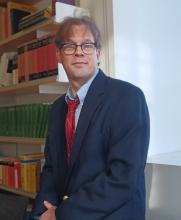
The article examines the tension in Marica Bodrožić’s German-language novel Kirschholz und Alte Gefühle, between the character Mateo’s working to rid the Croatian language of loanwords, which he calls linguistic invaders and the protagonist, Arjeta, who argues that the etymology of a word can teach you something about the history of a country. Both have opposite views of the connection between language and the nation. In the end, Mateo’s loanword-free language becomes almost incomprehensible.

72nd National Postgraduate Colloquium in German Studies (London, 28–29 April 2023)
Panel: Memory and Landscapes; Paper Title: “The Ethics of Narrating Catastrophe: Kleist’s Das Erdbeben in Chili”
In my paper, I explore the position of narrative texts in relation to broader public discourses on catastrophe, inquiring after the ethical implications of placing disasters within the framework of a story. Using Heinrich von Kleist’s Das Erdbeben in Chili as a case study, I show how the text both participates in and demonstrates the problematics of fashioning stories from catastrophe—and the social aftershocks that can arise from their telling.
ESSCS and TransHumanities Joint Summer School (Giessen, 19–23 June 2023)
Conference Theme: Bouncing Forward: Future Narratives, Scenarios, and Transformations in the Study of Culture
Panel: Shifting Cultures and Implications of Society; Paper Tile: “Foggy Pasts, Shifting Presents, Uncertain Futures: Wilhelm Raabe’s Pfisters Mühle: Ein Sommerferienheft”
This paper makes the claim that Raabe’s 1884 novel, Pfisters Mühle: Ein Sommerferienheft, is a text that attempts to depict and, in its failure, exemplifies the transformative processes of modernity and their effects on society. Utilizing the aesthetic properties of industrial pollution, Raabe’s novel shows how German society was adapting to a period defined by rapid change, providing for contemporary readers of the novel an opportunity to observe how a major author of nineteenth-century Germany was attempting to come to the terms with unprecedent challenges.
German Studies Association Annual Conference (Montréal, 6–8 October 2023)
Panel: Catastrophe and Critique
At this year’s GSA annual conference, I had the opportunity to co-organize with Prof. Christoph Weber (University of North Texas) a panel series on “Catastrophe and Critique.” After a very successful three days, we are now in the process of developing the contributions into a volume, which we will co-edit and to which I will provide my own essay.
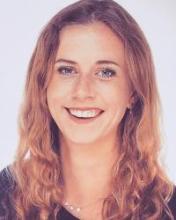
I had a blast in Montreal this October, where I attended the GSA and gave both a linguistics panel talk and a roundtable talk on teaching digital humanities in German Studies. Both focused on transcription. My linguistics lecture was called '“esel alles scheiße”: problematic podcast transcripts'. I addressed the need to make transcription guidelines applicable beyond linguistic use in order to improve (the accessibility of) German podcast transcripts in the long term. The roundtable talk was 'The Problem with NLP and Transcripts', where I delved deeper into the computational linguistic problems of automatically generated transcripts with Natural Language Processing (NLP).
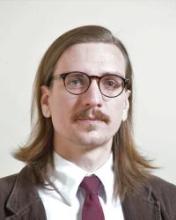
GSA Seminar. “Translating the Pacific: Georg Forster and the Order of Nature in Meiners, Kant, and Herder”
In this seminar, we read and discussed a number of late 18th century texts on race, anthropology, and global travel. I contributed by leading a discussion on Books 6 and 7 from Herder’s Ideen zur Philosophie der Geschichte der Menschheit. In particular, I tried to focus on the apparent contradictions between Herder’s rather overtly racist categorizing in Book 6 and his directly anti-racist and anti-imperial assertions in Book 7. It was a great experience to investigate these works and participate in discussions with other scholars.
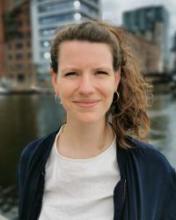
Early Modern Women on Politics and Ethics, 5.-7.10.2023 at the University of Gothenburg, Sweden
Panel: Public and Private Agency – The Ethical and Political Body; Paper: Catharina Elisabeth Velten. Defending the Stage and the Acting Profession
At this interdisciplinary conference I got to present my research on Catharina Velten’s manifesto, in which she argues vigorously against antitheatrical accusations by Johann Joseph Winckler. It was illuminating to see so many connections between presented works across different languages and centuries, juxtaposing similar strategies used by early modern women to succeed in the public sphere.
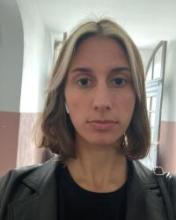
PAMLA (The Pacific Ancient and Modern Language Association), Panel: German & Shifting Perspectives (Oct, 27th 2023, Portland OR)
The PAMLA-conference was my first language related conference. I presented my paper on Multilingualism and Translanguaging in German as a Foreign Language Pedagogy. The paper focuses on promoting the equality of all languages of learners of German, and it presents ways as well as challenges of incorporating learners’ L1s and L2s into the German Classroom.
Getting the opportunity to present at a conference was a very exciting and helpful experience, and I hope for more opportunities like this in the future.
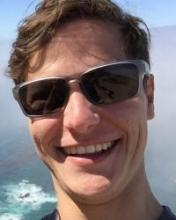
Conference: Zwischen Allegorese und Agency. Zur Narratologie mittelalterlicher Tierfiguren. (Philologicum, München, 15.-17. Juni 2023)
Panel: Tierfiguren zwischen Agency und Poetologie; Paper: Wolf Dietrich, der verwolfte König. Ächtung und Adel.
Exploring the particular side of allegorical wolfish ambivalence of belonging and dis-belonging to society, the wolf is found to bring together multiple sides of inclusivity. Looking at medieval concepts such as name-giving, baptism, and belonging to the children of God (Gotteskindschaft), the contribution critically confronts the set parallels between the medieval court and wolf identity explicit in the character of Wolf Dietrich and combines these with the 20th century theory by Gilles Deleuze and Felix Guattari.